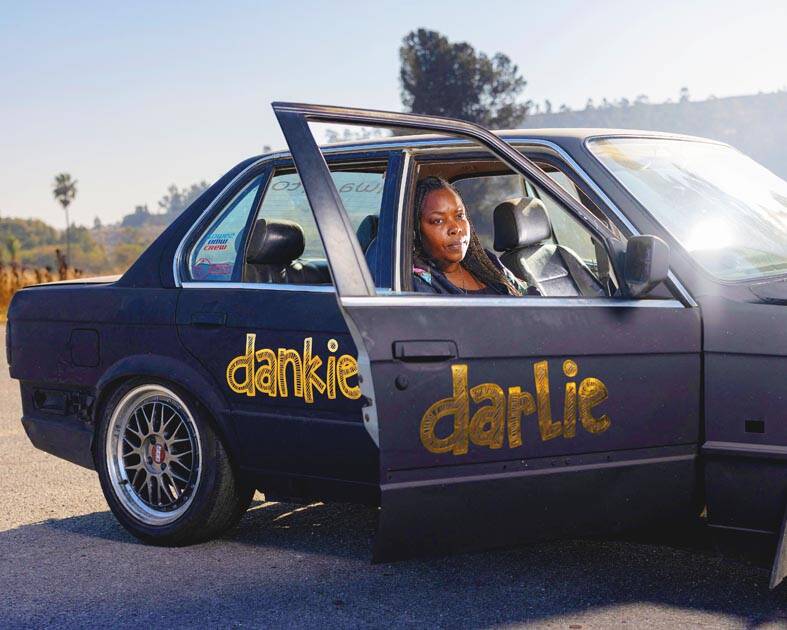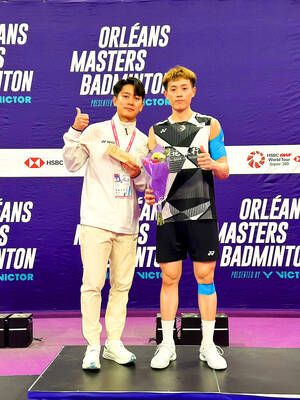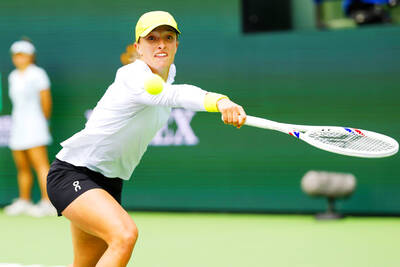Tires screech across an empty parking lot in Soweto as 40-year-old Nalo Jivhuho sends her black BMW skidding and spinning in a cloud of white smoke and fumes.
As soon as she slips into the hot seat, the human resources developer becomes “Dankie Darlie,” impassioned enthusiast of South Africa’s increasingly popular daredevil motorsport of spinning.
In a tank top and braids, Jivhuho uses her tattooed left arm to spin the steering wheel as she forces the car into high-speed skids and stunts like the circular maneuver called a doughnut.

Photo: AFP
“If you are able to make a tire pop, then you are pretty special,” said Jivhuho, mother of an admiring teenaged son.
“When you hear a pop, you are going to hear the crowd go wild,” she said.
This adrenaline-pumping sport was born in Johannesburg’s sprawling Soweto township in the 1980s, when South Africa was still under the race-based apartheid system.
“It used to be seen as a gangster sport associated with people going into the white areas to steal these shaped cars, come to Soweto and spin them,” Jivhuho said.
The underground image changed when spinning was recognized as an official sport 10 years ago. Today it has fans and performers across southern Africa and big brand sponsors.
At its most extreme levels, the passenger or even driver would climb out of the spinning car, hanging from the window or roof in stunts that thrill the crowds.
A few hours before Jivhuho’s training session, her four cars are checked over at her home by an all-male group of mechanics.
“She can kill you for these cars,” joked one of them, Nqobile Tshabalala.
“Maintaining these spin cars is a lot, but I have a great support system from my family and my team. Without them, Dankie Darlie would not exist,” Jivhuho said.
She wants to make one thing clear: She is not “one of the boys.”
“Spinning is a way of me expressing myself, expressing my femininity,” she said. “I inspire other females and that’s a big thing because there aren’t a lot of us females in the spinning industry in South Africa.”
Young women are also among the drivers at a weekend show at the Wheelz N Smoke arena southeast of Johannesburg.
The atmosphere is festive as hundreds of spectators, some with coolers and shisha pipes, cheer on spinning crews who have come from across the country to show off their skills.
The noise and smell of burning rubber and exhaust fumes is intoxicating. Of the more than two dozen cars taking part, some have no hoods or windscreens, and one is souped up to look like a New York taxi.
In some performances, a passenger leans right out of the car to hype the crowds as the driver pulls stunts and maneuvers around obstacles. There are a couple of cars with just a solo woman at the wheel; in one, a mom and dad are in the front seats with their two children in the back.
Off track, men carry away shredded tires.
“Man, I’m a petrol head, so anything that makes some noise and a lot of smoke will get me going!” said Chahid, who only gives his first name, as he watched from his burger stand.
He enjoys this arena, the oldest in South Africa.
“It’s secured, the kids are safe, families can come, it becomes a family affair,” he said.
As the sport became recognized, the arena moved spinning off the streets and into a space that better protects spectators.
“It is more of a danger to them if a car happens to lose control,” said the owner, Monde Hashe.
“I started spinning when it was illegal,” professional spinner Iksaan “Iki” Khan said.
“When this place opened, we had more opportunities and more play time,” he said, as he headed out to perform.

Taiwanese badminton player Lin Chun-yi had to settle for silver in the men’s singles at the Orleans Masters in France on Sunday after losing in the final to his French opponent. The 25-year-old Lin, ranked world No. 14, lost to Alex Lanier 13-21, 18-21 in a match that lasted 42 minutes at the Palais des Sports arena. It was the first time that the two players were facing each other in their professional careers. In the opener, Lin was slow to warm up, which gave the 20-year-old Lanier an opportunity to take an early lead with seven consecutive points. Despite

Paris Saint-Germain on Tuesday held their nerve to beat Liverpool 4-1 on penalties and reach the UEFA Champions League quarter-finals after their tie finished one-apiece on aggregate, while Bayern Munich saw off Bayer 04 Leverkusen to complete a 5-0 win over both legs. Lamine Yamal and Raphinha fired Barcelona into the next round as the Catalans bested SL Benfica 3-1, and Inter booked a last-eight meeting with Bayern by seeing off Feyenoord 2-1. At Anfield, Ousmane Dembele netted the only goal of the night as PSG bounced back from Liverpool’s late winner last week to force the tie to extra-time and penalties. Maligned

Taiwan’s Lin Chun-yi on Wednesday inflicted a first-round defeat on former badminton world No. 1 Viktor Axelsen at the All England Open. Lin came out of top after a back-and-forth first game before Axelsen dominated the second, but the Dane was not able to keep that form in the decider as Lin reeled off six points in a row on the way to a 21-19, 13-21, 21-11 victory. “If I don’t play my best, everyone can win against me,” said Axelsen, the world No. 4. “Today’s opponent played a fantastic game; it was disappointing, but that is how it is.” “I just tried

Two-time Indian Wells champion Iga Swiatek on Thursday avenged her shock Paris Olympics loss to Zheng Qinwen with a 6-3, 6-3 win over the Chinese eighth seed, setting up a semi-final against 17-year-old Russian Mirra Andreeva in the California desert. In the men’s singles, Spain’s Carlos Alcaraz put on a show with his acrobatic shotmaking under the lights to close out the day’s action, overcoming a 4-1 second-set deficit to defeat Francisco Cerundolo 6-3, 7-6 (7/4), while Taiwan’s Hsieh Su-wei crashed out of the women’s doubles. Swiatek, one of the gold medal favorites when she lost to eventual champion Zheng in the